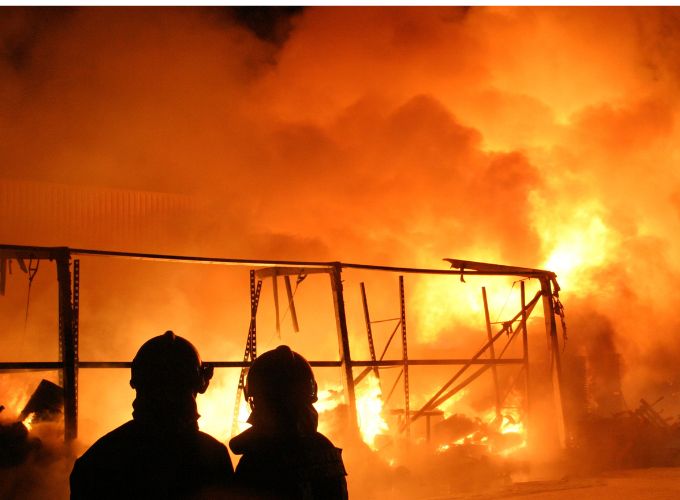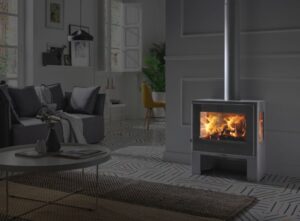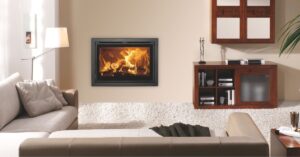
Hygge isn’t a season, it’s a way of being in the world We’ve been taught that fire is only lit when it’s cold.That the wood

Fires are one of the main threats to the safety of people and property in homes. According to data from the Mapfre Foundation and the Professional Association of Fire Technicians (APTB), in 2021 there were 48 fires a day in homes in Spain, with December being the most critical month due to the use of heating systems. Among these systems, stoves are one of the most frequent causes of fires, whether wood, gas or electric. Fires caused by these appliances are very common in winter both in homes and in workplaces. These fires can have serious consequences for people’s lives and health, as well as for the property of the owners or tenants.
Stoves can be one of the most useful sources of heat during the colder months, as well as being more economical and environmentally friendly than other devices, but they can also be dangerous if not used and maintained properly. In this post we will give you the necessary advice to prevent fires and to act correctly if they occur.
As we all know, the installation of a wood burning appliance must be carried out by a professional to avoid future problems with its operation, however, this does not guarantee that you will not have problems with your stove in the future, you must carry out constant checks on the appliance. A simple mistake or incorrect maintenance over a period of time can cause serious problems, which will endanger the safety of your home and, more importantly, your family, who could be exposed to toxic gases produced by your wood-burning appliance.
It is important to light your stove correctly. Poor combustion of the appliance can cause safety problems. If the appliance is not lit properly, the build-up of gases and residues can cause dangerous fires, as well as the release of carbon monoxide, a toxic, odourless gas that can be fatal.

It is important to maintain a clearance of at least three feet around your wood burning appliance. The stove should be away from any flammable objects, such as curtains, furniture or wallpaper. Also, avoid placing objects on top of the stove that could catch fire.
Neglecting your wood-burning appliance for a certain period of time can lead to risks that you should be aware of: carbon monoxide build-up, fires due to lack of fire supervision or health problems associated with exposure to smoke or particles from the chimney, among many others. These appliances need your constant attention and care to perform their function correctly and safely.
You can read more about why you should not leave your device unattended by clicking here.
The stove should only be used to heat a specific room and not to heat the whole house. Excessive use of the stove can lead to possible fires due to the accumulation of residues or sparks, but this is not the only danger you may face, it can also generate fumes and ashes that are harmful to health and the environment if not properly ventilated.
The stove should be cleaned regularly and kept free of debris, ashes and other materials that may clog the vents. In addition, make sure that the ventilation ducts are clean and free of obstructions.

Make sure you have a fire extinguisher on hand in case of emergency. Make sure the fire extinguisher is suitable for appliance fires and that everyone in the house knows how to use it in an emergency.
It is important to have a clear exit route in case of fire. Practice regularly with the whole family to make sure everyone knows what to do in an emergency. Also, make sure that all doors and windows are easy to open and that exits are clear.

Smoke from a stove fire poses serious health, property and safety risks. These are just some of the effects that smoke from a stove fire can have:

In the event of a fire with your appliance, it is important to act quickly and follow these safety tips to minimise damage and protect the safety of everyone in the home.
If you have any questions, please feel free to ask us! We hope this post has served as a guide. Take a look at our blog and find solutions and recommendations to help you with your fireplace or wood stove.
Visit our online store for Panadero wood stoves. If you have any questions or need help choosing the right stove, don’t hesitate to contact us. We will be happy to help you.
Articles of interest:
Did you like this article? If so, help us spread it 😊 . Click on the buttons below here and feel free to share it on your social networks!
Thank you for reading!
↓ ↓ ↓ ↓

Hygge isn’t a season, it’s a way of being in the world We’ve been taught that fire is only lit when it’s cold.That the wood

The afternoon of April 28, 2025, will be remembered by many: a total blackout left the entire Iberian Peninsula without power for hours. Trains halted,

Internships make all the difference when it comes to finding a job. Finding a job isn’t easy. But there’s one real, direct and effective path

Wood Stoves: The Warm Heart of Your Home Deserves Special Care. Wood stoves are much more than just a heating system—they are the soul of